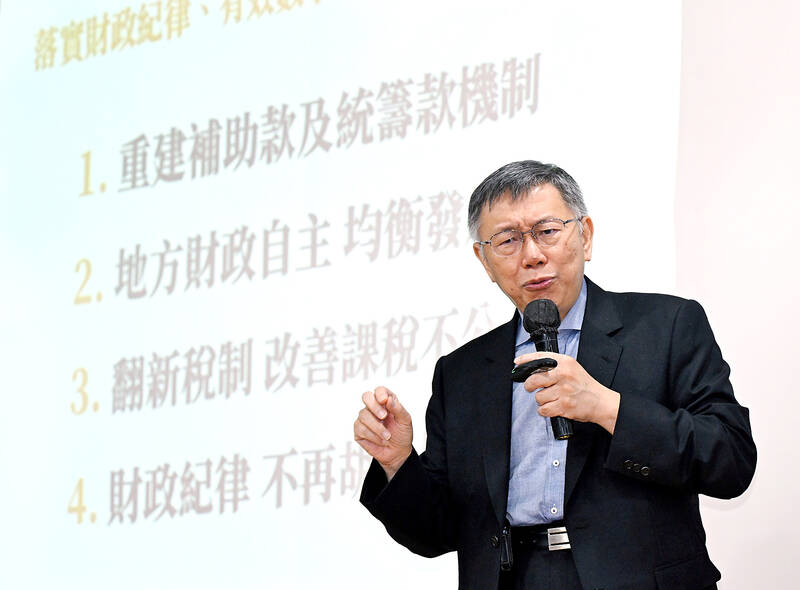The Democratic Progressive Party (DPP) yesterday accused Taiwan People’s Party (TPP) Chairman and presidential candidate Ko Wen-je’s (柯文哲) of financial mismanagement when he was Taipei mayor, rebutting the latter’s claim that he is the best in maintaining fiscal discipline and safeguarding taxpayers’ money.
“Ko is deceiving the public, touting his abilities to govern, save taxpayers’ money and pay off the city government’s debt, while accusing the central government of profligate spending,” DPP spokesman Chang Chih-hao (張志豪) told a news conference in Taipei. “It is Ko misleading the public again with wrong information.”
Pointing to Ko’s claim that he had paid off Taipei’s NT$57 billion (US$1.76 billion) debt, DPP spokeswoman Michelle Lin (林楚茵) said that Ko borrowed reserved funds from foundations and agencies under the city government’s administration, and used the money to window-dress the figures.

Photo: Liao Chen-huei, Taipei Times
“It is an old accounting trick — borrowing from Peter to pay Paul — which depletes assets under government control,” she said.
Chang and Lin were responding to Ko’s presentation earlier yesterday of his political platform, in which he said he would focus on fiscal restraint and government responsibility, as he accused the DPP government of having poor financial policies, extravagant spending and unequal resource allocation that has created poor and wealthy regions.
Ko is known for his “eight big project failures,” which cost taxpayers more than NT$400 million, Chang said.
These included NT$3 million to set up mask vending machines during the peak of the COVID-19 pandemic, with only 24 masks being sold per day, he said.
Another big flop was the NT$11.82 million spent on a “mobile police station” pilot program, which was terminated early, he said.
Ko also approved NT$70 million for the city government to set up 69 apps to provide better services to residents, but 54 of them have been taken down, resulting in losses at least NT$33.5 million, he said.
The city government, led by Ko, spent NT$138 million for displays and activities for the 2016 Taipei World Design Capital event, but some display items repeatedly broke down, Lin said.
Another NT$71 million went into the 2020 Taipei Lantern Festival, which garnered bad reviews, receiving only a 28 percent satisfactory rating, the lowest ever for similar events hosted by other cities over the years, she said.
During his presentation earlier yesterday, Ko presented four guidelines for government.
First is to promote more equitable distribution of tax revenues by applying current standards on fund allocation for the six special municipalities to all other cities and counties.
Second is to push for fiscal autonomy for local governments by drafting policies that would boost tax revenues to promote more balanced development in poorer municipalities.
Third is convening national meetings to discuss tax reforms, including abolishing the entertainment tax and stamp duty, and creating an oversight mechanism to prevent the rich from not paying their fair share of taxes, including taxes on income earned abroad.
Fourth is pursuing fiscal discipline, including stopping tax collections that have resulted in large surpluses in recent years.
He said President Tsai Ing-wen’s (蔡英文) administration have trumpeted its revenue surplus of NT$180 billion last year, which he said the central government had squandered.
Additional reporting by Chen Cheng-yu

Chinese spouse and influencer Guan Guan’s (關關) residency permit has been revoked for repeatedly posting pro-China videos that threaten national security, the National Immigration Agency confirmed today. Guan Guan has said many controversial statements in her videos posted to Douyin (抖音), including “the red flag will soon be painted all over Taiwan” and “Taiwan is an inseparable part of China,” and expressing hope for expedited reunification. The agency last year received multiple reports alleging that Guan Guan had advocated for armed reunification. After verifying the reports, the agency last month issued a notice requiring her to appear and explain her actions. Guan

GIVE AND TAKE: Blood demand continues to rise each year, while fewer young donors are available due to the nation’s falling birthrate, a doctor said Blood donors can redeem points earned from donations to obtain limited edition Formosan black bear travel mugs, the Kaohsiung Blood Center said yesterday, as it announced a goal of stocking 20,000 units of blood prior to the Lunar New Year. The last month of the lunar year is National Blood Donation Month, when local centers seek to stockpile blood for use during the Lunar New Year holiday. The blood demand in southern Taiwan — including Tainan and Kaohsiung, as well as Chiayi, Pingtung, Penghu and Taitung counties — is about 2,000 units per day, the center said. The donation campaign aims to boost

The Kaohsiung Tourism Bureau audited six hotels in an effort to prevent price gouging ahead of Korean band BTS’ concert tour in the city scheduled for Nov. 19, 21 and 22 this year. The bureau on Friday said that the audits — conducted in response to allegations of unfair pricing posted on social media — found no wrongdoing. These establishments included the local branches of Chateau de Chine, Hotel Nikko, My Humble House, and Grand Hai Lai, it said, adding that the Consumer Protection Commission would have penalized price gougers had the accusations been substantiated. The bureau said the Tourism Development Act

BACK TO WINTER: A strong continental cold air mass would move south on Tuesday next week, bringing colder temperatures to northern and central Taiwan A tropical depression east of the Philippines could soon be upgraded to be the first tropical storm of this year, the Central Weather Administration (CWA) said yesterday, adding that the next cold air mass is forecast to arrive on Monday next week. CWA forecaster Cheng Jie-ren (鄭傑仁) said the first tropical depression of this year is over waters east of the Philippines, about 1,867km southeast of Oluanpi (鵝鑾鼻), and could strengthen into Tropical Storm Nokaen by early today. The system is moving slowly from northwest to north, and is expected to remain east of the Philippines with little chance of affecting Taiwan,